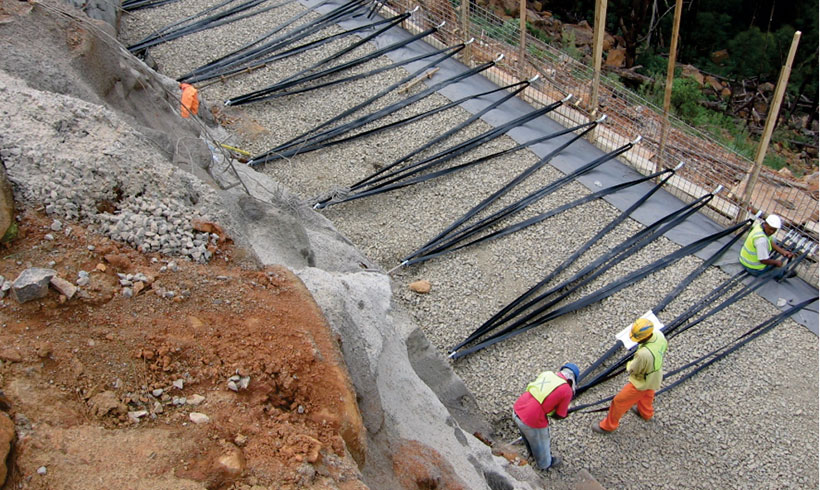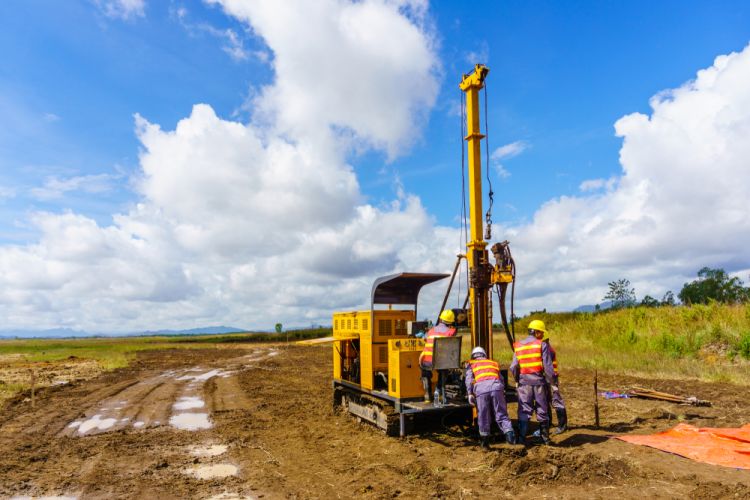9 Simple Techniques For Specialized Geotechnical Engineering Solutions
9 Simple Techniques For Specialized Geotechnical Engineering Solutions
Blog Article
Specialized Geotechnical Engineering Solutions - Questions
Table of ContentsNot known Details About Specialized Geotechnical Engineering Solutions Some Known Factual Statements About Specialized Geotechnical Engineering Solutions The Single Strategy To Use For Specialized Geotechnical Engineering Solutions7 Simple Techniques For Specialized Geotechnical Engineering Solutions
They conduct website investigations, accumulate samples, perform lab tests, and assess information to evaluate the suitability of the ground for building and construction jobs. Based upon their findings, geotechnical designers supply suggestions for structure layout, slope security, retaining frameworks, and mitigation of geotechnical hazards. They work together with other specialists, such as designers, structural designers, and building and construction teams, to ensure that geotechnical factors to consider are incorporated into the total job layout and application.
Foundation Style: Geotechnical engineers play an essential role in creating foundations that can safely sustain the designated framework. They assess the dirt problems and tons requirements to determine the ideal structure type, such as shallow foundations (e.g., footings), deep foundations (e.g., piles), or specialized methods like dirt renovation. They consider elements such as negotiation restrictions, birthing capacity, and soil-structure communication to create ideal foundation designs.
The Facts About Specialized Geotechnical Engineering Solutions Uncovered
Right here are some kinds of geotechnical engineers: Foundation Engineer: Foundation designers focus on making and evaluating structures for frameworks - Specialized Geotechnical Engineering Solutions. They examine the dirt conditions, tons demands, and site characteristics to determine the most suitable foundation kind and design, such as superficial foundations, deep foundations, or specialized techniques like pile foundations
They perform area testing, gather samples, and assess the gathered information to define the soil homes, geologic formations, and groundwater problems at a site. Geotechnical Instrumentation Designer: Geotechnical instrumentation engineers concentrate on tracking and determining the behavior of dirt, rock, and structures. They mount and preserve instrumentation systems that check aspects such as dirt negotiation, groundwater degrees, slope activities, and structural variations to assess performance and give early cautions of potential concerns.
In the office atmosphere, geotechnical designers make use of specialized software tools to perform computations, create designs, and examine data. Specialized Geotechnical Engineering Solutions. They prepare reports, testimonial task specifications, connect with clients and staff member, and coordinate job tasks. The workplace setting provides a helpful atmosphere for study, analysis, and cooperation with other experts associated with the job
They frequently check out task sites to conduct website investigations, evaluate geotechnical conditions, and gather data for analysis. These brows through include traveling to various locations, occasionally in remote or tough surfaces. Geotechnical designers may do soil sampling, conduct tests, and display building activities to guarantee that the geotechnical facets of the job are being carried out appropriately.
5 Simple Techniques For Specialized Geotechnical Engineering Solutions
Geotechnical designers likewise work in specialized geotechnical laboratories. Geotechnical laboratory designers function extensively in these atmospheres, handling testing devices, running instruments, and recording data.
Retaining Wall surfaces: Producing walls that keep back dirt to avoid landslides and provide stability on sloped terrains. Embankments and Earthworks: Creating embankments for roadways, trains, and dams to guarantee they stay steady under stress. The mining market counts greatly on geotechnical engineering to guarantee the security and long life of its operations.
With this in mind, we have actually designed our program to prepare trainees for success. The Geotechnical Design program at the College of Delaware offers chances for innovative study and research study in: Dirt and rock mechanics Soil-structure interaction Constitutive modeling Computational geomechanics Structure and planet frameworks engineering Ground renovation Incline stability and landslide stablizing Liquefaction of soils and earthquake design Lab characterization of geomaterials and dirt reinforcement Environmental geotechnics Offered the strong need for enhancement to our nation's infrastructurethe American Culture of Civil Designers gave the U.S.
Geotechnical design is a branch of civil design; however, it includes making use of scientific approaches and principles to collect and translate the physical residential properties of the ground. Geotechnical engineers are included in all stages of the style of frameworks, from principle to construction. Their job is important in the design and planning process as they assess the integrity of soil, clay, silt, sand, and rock, prior to building and construction commencing.
How Specialized Geotechnical Engineering Solutions can Save You Time, Stress, and Money.
This is followed by a ground examination based on the searchings for of the workdesk study and entails trial matching and tasting to reveal any potential concerns. Geotechnical designers work within multidisciplinary teams, sustained by intermediate and younger designers in addition to by CAD specialists. As a senior geotechnical designer on a hydro plant project, jobs might consist of taking part in technological reviews (e.g., peer reviews), tailings clog examinations, dam security evaluations, and other researches Continue connected to the style and construction of mine waste facilities.
While some specialists specialise exclusively in geotechnics, others might function under titles like design geologist or ground engineer within similar capacities. As a geotechnical engineer, you'll need to: develop and keep partnerships with clients and other specialists associated with the site, throughout each projectmaintain safety criteria on website be mindful of cost implications when you make recommendationsstudy geological maps and airborne photographs from a series of resources and from various time periodsexamine construction intends to see exactly how feasible they are based on your understanding of the siteinvestigate threats or geological hazards for the sitesearch for ecologically sensitive features, such as land fill beginning to create factual and expository ground modelsplan area investigationsdrill and evaluate samples of bedrock, soil, groundwater and additional materials supervise various other specialists on sitesolve technological problems as they occur, such as unforeseen frameworks at drill sitesmonitor conditions throughout and after building and construction to make sure frameworks are secure in the short and long termadd information gathered on website to your directory preliminary researchcreate geotechnical estimations, drawings, and 2 or three-dimensional computer system designs translating the datamake recommendations about the recommended use of the site.
There are great deals of possibilities to fulfill new individuals, as you'll function with a range of specialists at every website. The work can be demanding as you may be liable for the safety of others while on website. There is likewise a high article level of economic duty, as the referrals you make can have serious cost implications.

Report this page